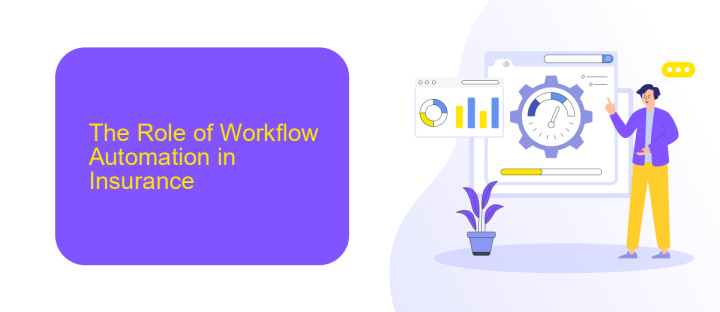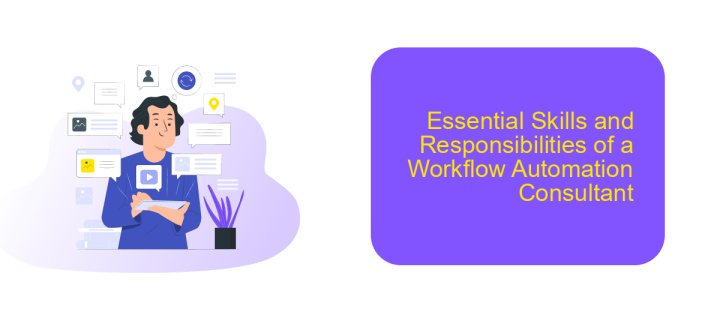Workflow Automation Consultant for Insurance Companies
In today's fast-paced insurance industry, optimizing operational efficiency is crucial for staying competitive. A Workflow Automation Consultant specializes in streamlining processes, reducing manual tasks, and enhancing productivity through advanced automation solutions. By leveraging their expertise, insurance companies can achieve significant cost savings, improve accuracy, and provide better customer service, ultimately driving business growth and success.
Insurance Industry Landscape and Challenges
The insurance industry is a complex and highly regulated sector that faces numerous challenges. Companies must navigate a labyrinth of compliance requirements, manage large volumes of data, and ensure customer satisfaction. These demands necessitate efficient and effective workflows to maintain competitiveness and profitability.
- Regulatory Compliance: Adhering to evolving regulations requires constant monitoring and updates.
- Data Management: Handling vast amounts of sensitive data securely and accurately is crucial.
- Customer Expectations: Providing quick and personalized service is more important than ever.
- Operational Efficiency: Streamlining processes to reduce costs and improve productivity is essential.
Integrating automated workflows can significantly alleviate these challenges. Tools like ApiX-Drive enable seamless integration of various software, ensuring data flows smoothly between systems. This not only enhances operational efficiency but also improves regulatory compliance and customer satisfaction by providing timely and accurate information. Embracing such technologies is key to staying ahead in the competitive insurance landscape.
The Role of Workflow Automation in Insurance

Workflow automation plays a pivotal role in the insurance industry by streamlining repetitive tasks, reducing human error, and enhancing overall efficiency. Automation tools can handle various processes, from customer onboarding and claims processing to policy renewals and compliance checks. By automating these tasks, insurance companies can focus on more strategic activities, such as improving customer service and developing new products. This not only leads to cost savings but also improves the accuracy and speed of operations, ultimately enhancing customer satisfaction.
Moreover, integrating different systems and software is crucial for seamless workflow automation. Services like ApiX-Drive facilitate these integrations by connecting various applications, ensuring data flows smoothly between them. This integration capability allows insurance companies to automate complex workflows without the need for extensive coding or manual intervention. As a result, insurers can achieve a higher level of operational efficiency, better data management, and a more responsive approach to customer needs. By leveraging workflow automation and integration tools, insurance companies can stay competitive in a rapidly evolving market.
Benefits of Implementing Workflow Automation

Implementing workflow automation in insurance companies offers numerous benefits that significantly enhance operational efficiency and customer satisfaction. By automating repetitive tasks, companies can allocate more time and resources to value-added activities, leading to improved productivity and reduced operational costs.
- Increased Efficiency: Automation streamlines processes, reducing the time and effort required to complete tasks.
- Error Reduction: Automated workflows minimize human errors, ensuring higher accuracy and consistency in operations.
- Better Compliance: Automation helps maintain regulatory compliance by ensuring that all processes adhere to industry standards.
- Improved Customer Service: Faster processing times and accurate data handling result in better customer experiences.
- Enhanced Data Management: Automated systems provide better data tracking and reporting, aiding in strategic decision-making.
- Seamless Integration: Tools like ApiX-Drive facilitate easy integration of various applications, ensuring smooth data flow and interoperability.
By leveraging workflow automation, insurance companies can not only optimize their internal processes but also offer superior service to their clients. The integration capabilities provided by platforms like ApiX-Drive further enhance the effectiveness of automation by ensuring seamless connectivity between different systems and applications.
Essential Skills and Responsibilities of a Workflow Automation Consultant

A Workflow Automation Consultant for insurance companies plays a crucial role in streamlining operations, enhancing efficiency, and reducing manual tasks. This professional must possess a blend of technical expertise and industry-specific knowledge to address the unique challenges faced by insurance firms.
Key responsibilities include analyzing existing workflows, identifying bottlenecks, and designing automated solutions tailored to the company's needs. Consultants must also ensure seamless integration with existing systems and provide ongoing support and optimization.
- Proficiency in workflow automation tools and software.
- Strong understanding of insurance industry processes and regulations.
- Ability to design and implement custom automation solutions.
- Experience with integration platforms like ApiX-Drive for connecting various systems.
- Excellent problem-solving and analytical skills.
- Effective communication and project management abilities.
Incorporating automation into insurance workflows can significantly reduce operational costs and improve service delivery. By leveraging platforms like ApiX-Drive, consultants can facilitate seamless data exchange between disparate systems, ensuring a cohesive and efficient workflow. This not only enhances productivity but also allows insurance companies to focus on core business activities.
Best Practices and Emerging Trends in Workflow Automation
To optimize workflow automation in insurance companies, it is crucial to adopt best practices such as identifying repetitive tasks that can be automated, ensuring data accuracy, and maintaining compliance with industry regulations. Regularly updating the automation tools and processes is essential to keep up with technological advancements and mitigate any risks. Employee training and stakeholder engagement are also key components to ensure smooth implementation and to maximize the benefits of automation.
Emerging trends in workflow automation include the use of AI and machine learning to enhance decision-making processes, and the integration of various software through platforms like ApiX-Drive. ApiX-Drive enables seamless connectivity between different applications, reducing manual intervention and improving efficiency. Additionally, the rise of low-code and no-code platforms allows non-technical staff to create and modify automation workflows, fostering innovation and adaptability within the organization. By staying abreast of these trends, insurance companies can continue to streamline their operations and enhance customer satisfaction.
- Automate the work of an online store or landing
- Empower through integration
- Don't spend money on programmers and integrators
- Save time by automating routine tasks
FAQ
What is a Workflow Automation Consultant for Insurance Companies?
How can workflow automation benefit an insurance company?
What types of processes can be automated in an insurance company?
How do you approach the implementation of workflow automation?
What challenges might an insurance company face during the automation process?
Apix-Drive is a universal tool that will quickly streamline any workflow, freeing you from routine and possible financial losses. Try ApiX-Drive in action and see how useful it is for you personally. In the meantime, when you are setting up connections between systems, think about where you are investing your free time, because now you will have much more of it.


